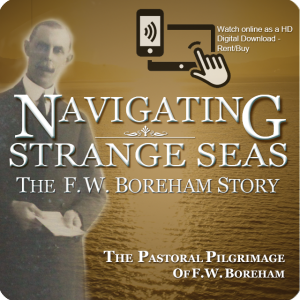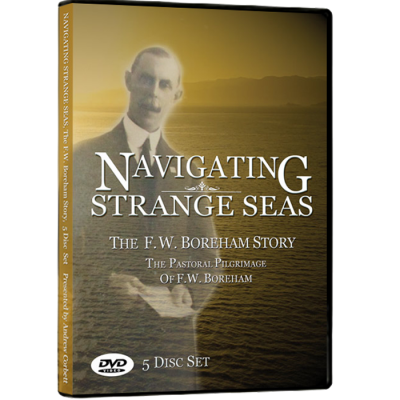home > books by FWB > 1945, A Late Lark Singing >
Chapter VI
The Vale of the Cairn and the Scaur
WE all have our strange whims and old fancies. At about the time of my ordination at Mosgiel, the Life of Thomas Boston fell into my hands, and, in reading it, I conceived an intense desire to see Ettrick—Sir Walter Scott’s Ettrick, William Wordsworth’s Ettrick, James Hogg’s Ettrick, Mungo Park’s Ettrick, Thomas Boston’s Ettrick.
But, like so many of the best things and the best people, I found Ettrick singularly shy and unapproachable. It is of no use going to the booking-office at Waverley Station, Edinburgh, and asking for return tickets to Ettrick. The clerk will probably consult his time-table and solemnly assure you that there is no such place. Nor, from his point of view, is there. For, to this day, Ettrick has never heard the scream of a railway train.
I first revisited the homeland just before motor cars came into vogue. When in Scotland I inquired about Etnick; but I was told that unless I was prepared to spend a night or two at out-of-the-way hostelries, and to undertake long walks on rough roads, I had better leave Ettrick to its eternal silence. When next I found myself in Scotland, many years later, I spent several delightful days in the Border country; but I discovered that I could only include Ettrick in my itinerary by cutting out half a dozen places that I specially wished to see; and so, a second time, Ettrick eluded me. On my third trip to Scotland, four years later, I actually set out for Ettrick-and lost my way! But, eight years later still, my great moment came.
I was spending an hour with a group of charming folk in Edinburgh who had it in their hearts to show me some memorable kindness.
‘Is there any place in this part of Scotland that you would like to see?’ the Rev. W. C. Macdonald of Palmerston Place innocently inquired. My heart missed a beat.
‘There is, indeed!’ I replied excitedly, ‘I would give a king’s ransom, if I possessed such a thing, to see Ettrick!’
‘Splendid!’ they cried. ‘We’ll go to-morrow!’ And on the morrow, with the sun shining, and all the birds singing, we made our way to Ettrick!
And what a drive that was! We sped down through the beautiful and romantic scenery that is still haunted by the glorious ghost of Sir Walter Scott, the countryside of which he knew every stick and stone. We glanced afresh at Abbotsford, Melrose Abbey, and Dryburgh, and then made our way along the lovely banks of St. Mary’s Loch, passing the Grey Mares’ Tail Waterfall and Tibbie Shiels’s Inn, and on to the hill road that, after a long climb, drops down into Ettrick Valley. I had reached my goal at last!
What these wild hills and desolate valleys meant to Sir Walter Scott, readers of Lockhart very well know. He was sheriff of this mountainous and well-watered countryside, and gloried in being king o’ the cairn and the scaur, as he called it. When visitors came to enjoy his bounteous hospitality, nothing would do but they must set off for the Ettrick Valley at the earliest possible moment. Wordsworth, with Dorothy in attendance, dropped in on Scott in 1803. The two men were then in their early thirties, with the gates of fame yet waiting to be stormed, Before the poet and his sister realized what was happening, they found themselves with Scott at Ettrick, and to that introduction we owe some of the sweetest of Wordsworth’s rural melodies.
Fourteen years later Scott tremendously amused Washington Irving by his exuberant enthusiasm for these rugged scenes, He made Irving clamber to a rocky hilltop, from which an indescribable panorama invited admiration.
‘Now,’ exclaimed Scott rapturously, ‘I have brought you, like Bunyan’s pilgrim, to the top of the Delectable Mountains, that I may show you all the goodly regions hereabouts. Yonder is Lammermuir and Smailholme; and there you have Galashiels and Torwoodlee and Gala Water, In that direction you see Teviotdale and the Braes of Yarrow, with Ettrick stream winding along like a silver thread to throw itself into the Tweed!’ ‘He rattled on like this’, says Washington Irving, ‘mentioning one name after another, many of which had received their romantic interest from his own pen. In fact, I saw the Border country spread out before me, and could trace the scenes of those poems and romances which had bewitched the whole world,’ Scott always hoped that, when all his powers forsook him, he might still feel the breeze down Ettrick break, and, in a touching passage, Lockhart tells us how, in his final frailty, his life-long wish was realized.
Literature treasures few more poignant stories than the story of Wordsworth’s last visit to this neighbourhood, shortly after the death of Scott. He is sixty-two, Leaning heavily upon a stick, he toils slowly and painfully up the slope, and then pauses, partly to take breath and partly to survey once more the exquisite stretch of emerald woodland and sparkling stream. But the grandeur of the silent hills, the perfume of the tossing hyacinths, the chirping of the grasshoppers at his feet, and the haunting laughter of the silent stream below, all fail to gladden him to-day. The beauteous landscape of leafy wold and laughing water is bathed in radiant sunshine; yet for him the skies are grey and earth is wrapped in gloom. His countenance is sad and pensive, for he is conjuring up the memory of happier days. He thinks of Dorothy, who was with him when he wrote Yarrow Unvisited, Yarrow Visited and Yarrow Revisited. And now Dorothy is ill, so ill that she can never really recover. And Scott, who first welcomed him to these heathery hills, and with whom he so often rambled along these woodland paths: Scott is dead! There are few things more affecting than to find the old familiar places, but to miss the old familiar faces. Wordsworth passes sadly over the crest of the hill, to visit the Yarrow Vale no more.
‘And so,’ I said to myself as I stood beside the Ettrick kirk, surveying the grimly sullen hills and the expanse of emerald pasture-land about me, ‘so this is Ettrick!’ I spent a few moments in poking about the churchyard. Here was the tomb of James Hogg, the Ettrick shepherd, the intimate, if somewhat uncouth, friend of Sir Walter. In his day, the musical and majestic minstrelsies of Hogg excited the admiration of the most eminent of his contemporaries. Hogg was twenty-six when Burns died. So far he had written nothing but a bunch of the sheerest trifles — songs for the lasses to sing’. But amid the storm of universal grief in which Robert Burns, cut off at thirty-seven, had descended to his grave, Hogg chanced to hear ‘a half-daft man’ refer to the dead minstrel as ‘the sweetest poet ever born’. The thought flashed into Hogg’s mind that so exalted a bard ought to have a successor. Upon whose shoulders should the mantle fall? Why not upon his? His face flushed and he caught his breath at the very thought of such a thing, but it became the ideal towards which he struggled during all the years that followed.
On the drive down from Edinburgh we had paused beside the beautiful monument to Hogg that adorns the green banks of St. Mary’s Loch, and now, at Ettrick, we stood beside his tomb. A stone near by marks the resting-place of four Covenanters who, in the stern old Claverhouse days, had been shot for their faith down at Moffat Water. A modest monument marks the grave of a shepherd who perished in a terrible snow-storm in this valley whilst attempting to save his flock. It bears the inscription: The Good Shepherd giveth His life for the sheep. Away in the corner you may see the tomb of an Ettrick minister who dearly loved his horse, a minister’s constant companion in those unmechanized days. When the poor beast died, his master sought permission to bury him in the kirkyard; but the Session shook their shaggy heads at the sacrilegious proposal. He therefore buried his steed just outside the churchyard, ordaining that his own bones should be laid just inside, with only the fence between.
Then, baring my head beside the resting-place of Thomas Boston, I plucked from among the grass on that honoured grave the wild flowers that, carefully preserved and pressed, lie before me as I write. We had already been shown, at the manse, some of the relics of the Boston age. In those days, churches were not seated; people brought their own stools; that explains why fenny Geddes found it so easy to express her dissent from the preacher by hurling her stool at his head. Here was one of those stools, together with the Session Minute Book, the ladle-with a handle as long as a broom-handle with which the collection was gathered, and the queer little bell that Mr. Boston himself rang when he was ready for the people, gathered in little knots and groups about the surrounding fields, to come in to the service.
It seemed incredible, as I stood beside that lonely kirk, and surveyed the vast expanse of hill and dale around me, that here, at Ettrick, Thomas Boston exercised one of the most gracious, one of the most powerful, and one of the most fruitful ministries that even Scotland-that land of noble ministries-has ever produced. The whole country felt its fragrant influence.
Whenever I am inclined to pessimism, or am tempted to suppose that modern conditions preclude the possibility of a rich and prosperous ministry, I reflect on the conditions that beset poor Thomas Boston. On the self-same day that witnessed the union under one crown of the English and Scottish realms, on May Day, 1707, Boston settled at Ettrick. The church had but few members, and even these were of such a type that their behaviour was a reproach to the sanctuary. The broken-hearted young minister was horrified to find that many of these parishioners of his could scarcely speak without profanity, whilst others were addicted to lives of shameless immorality. Even when they came to church, the conduct of these people was disorderly and indecent to the last degree. Many of them loitered about the churchyard, arguing and brawling whilst worship was proceeding; and elders had to be told off to keep order both inside and outside of the building. It was three years before Mr. Boston would allow the Lord’s Supper to be observed among them. ‘I have been much discouraged with respect to my parish for a long time,’ he says in his Memoirs, ‘and have had little heart for my work.’ For twenty-five years, however, he ministered incessantly to this people. He visited them all in their homes; pleaded with them each in secret; invited the heads of the household to the manse and taught them how to conduct family worship. After three years he was sufficiently assured of the sincerity of a handful of his people to admit them to the Lord’s Table. Five years later he is delighted at finding that he has a hundred and fifty devout communicants.
Later still Mr. Boston witnesses the most surprising spectacle in this same valley. People come in streams from far and near to be present at the Communion Service at Ettrick. He tells us that it often reminded him of the Jewish pilgrims in Old Testament times ascending in companies to Jerusalem to keep their Passover. When the sacred season came round, he had to call in other ministers to help him dispense the mystic symbols. The wilderness had become a fruitful field. The Ettrick manse was every week the resort of eager penitents, who, beholding with amazement the transformation in so many lives around them, were anxious to catch the holy contagion. In every house, family worship sanctified the opening and sweetened the close of each succeeding day. And the old church under the hill was, to hundreds and hundreds of people, the dearest spot that human eyes had ever seen.
IV
Let no man suppose that Thomas Boston achieved his triumph by means of brilliant gifts. Unversed in oratory and possessed of no outstanding qualities, he was just a good, honest, plain-spoken, harding-working minister. His sheer downright goodness won the hearts of his people.
Oppressed by the isolation of his manse, and by the difficulty of getting books, he turned his loneliness to excellent account. If other books were inaccessible, he would concentrate on one. He determined to master his Bible and to master it in the original tongues. As a result, he became one of the most finished Hebraists of his day. Not content with reading Hebrew, he could speak it. And, like some missionaries of long experience who acquire the habit of thinking in Chinese or Bengali, Thomas Boston could think in the language in which the prophets thought. His Hebrew studies, so far from being a drudgery, became a perfect revelry with him.
Moreover, in this out-of-the-way manse, he himself wrote a book, The Fourfold State quickly won its way into every part of the country. ‘From Abb’s Head to the remotest part of Galloway’, Dr. Andrew Thomson says, ‘it was to be seen side by side with the Bible and Bunyan on the shelf in every peasant’s cottage. The shepherd bore it with him, folded in his plaid, up among the silent hills; the ploughman in the valleys refreshed his spirit with it, as with heavenly manna, after his long day of toil. The influence, which began with the humble classes, was wafted like a fragrance into the mansions of the Lowland laird and the Border chief, and carried with it a new and hallowed joy.’ And on the authority of one who lived nearer to Boston’s time, Dr. Thomson says that, for three generations, this book was the instrument of more numerous conversions and more extensive spiritual quickening than any other volume he could name. And has not Dr. Thomas McCrie, one of the greatest authorities on Scottish life and literature, spoken of The Fourfold State as a book that has contributed more than any other work to mould the religious sentiments of the Scottish people?
During those twenty-five years at Ettrick I doubt if Mr. Boston ever once left his pulpit, either on account of illness or to take a holiday, or to exchange with another minister. Pressed to preach elsewhere, he always answered that he could not leave ‘his handful’.
He had his sorrows. For fifteen years his wife was the sunshine of his days. Then her mind collapsed, and, for the last ten years of Mr. Boston’s life, she was a prisoner in her own room. When her affliction rendered her violent or noisy, Mr. Boston and the family lived in the barn and the stables until the spasm had passed. It would have been in line with the usage of the period to have consigned her to the stable at such times; but that was not Mr. Boston’s. His evangelistic witness never wavered. Since he himself, as a boy, had been led to the Saviour by a sermon, preached by Henry Erskine, on Behold the Lamb of God, he resolved that, to the last, he would strive, by every utterance of his, to point his people to the Cross.
Yes, to the last! As his last Sunday approaches he, desperately ill, insists on preaching, ‘I have never yet known a silent Sabbath,’ he says smilingly, ‘and it’s too late to start now!’ He orders his bed to be drawn up to the window and prepares to address his people for the last time. Sunday comes. From all the farms and homesteads of that Selkirkshire countryside, ploughmen and shepherds, accompanied by their wives and children, set out early in the morning to hear their old minister’s last words. From all round the slopes of Ettrick Pen, from the distant foothills of Broad Law, from the lovely shores of St. Mary’s Lake, from all down the valleys of the Ettrick and the Yarrow, little groups of men and women make their way with heavy footsteps to the manse. The church itself is closed. The dying man turns his deathbed into a pulpit, and the whole countryside gathers to listen to his last message.
The eager multitude stretches far beyond the reach of his thin, wavering voice. But those who cannot hear can at least see his pale, wan face, and note the fire in his eye that even death is impotent to quench. As he sits, propped up by pillows, pleading with his people for the last time, the mountain breezes play with his thin, silvery hair. He exhausts the last atom of his failing strength as he pours out his soul in affectionate admonition and passionate entreaty, ‘Behold the Lamb of God!’ he cries. His voice falters; the watchers round the bed gently remove the pillows that support him, and he lies prostrate, breathing heavily. The window is closed, and the great black crowd, breaking up into little groups again, melts sadly and silently away. In a few days it is tearfully whispered in every cottage that Thomas Boston is dead.
So I realized my dream. I actually visited Ettrick at last. And what did I see there? A stern old church: a plain, old-fashioned manse; some trees and some tombstones; some hills and some hollows. And yet I came away feeling that I had been compassed about by a great cloud of witnesses; that, external appearances not- withstanding, I had been standing in the centre of immensities, in the conflux of eternities; and that, above the bleating of the sheep and the trilling of the larks, I had heard the songs of the seraphim.
-F.W. Boreham




















0 Comments